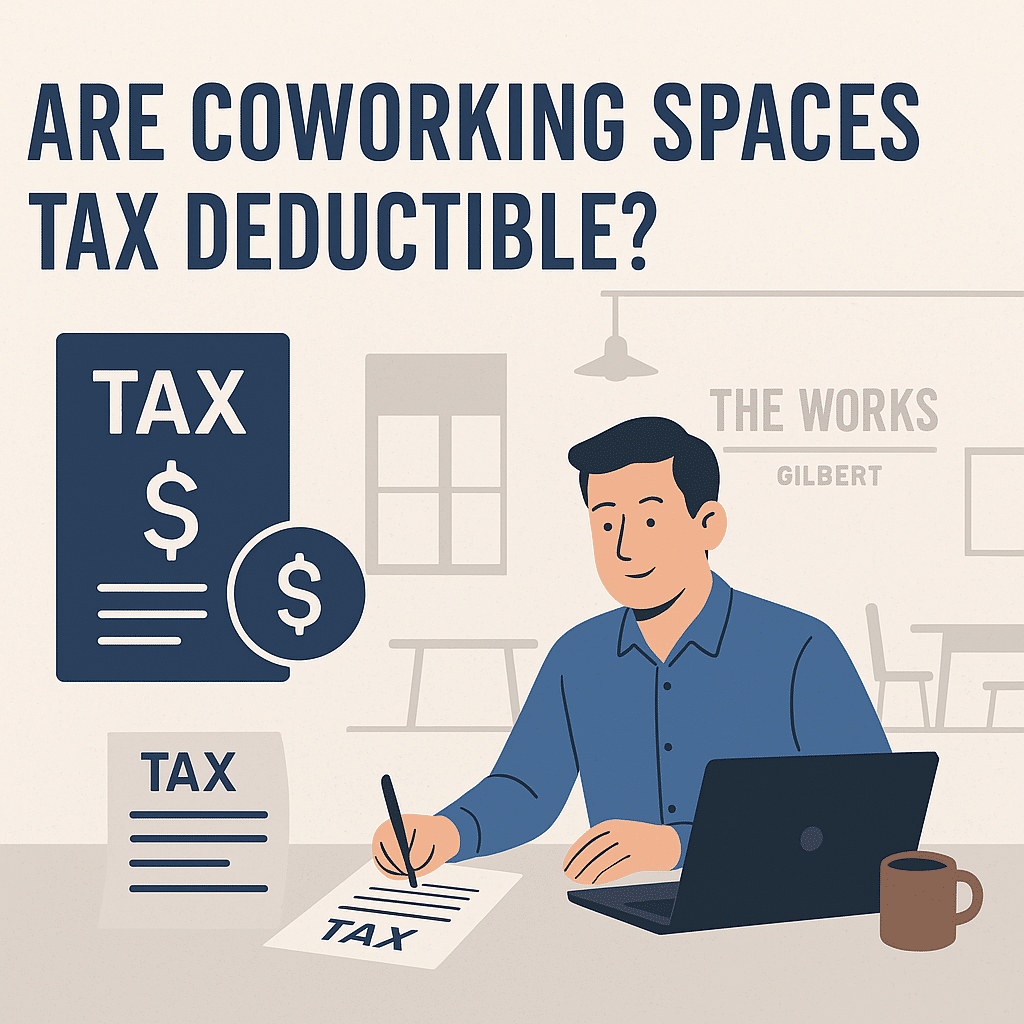Are Coworking Spaces Tax Deductible?
Coworking spaces have become a go-to solution for freelancers, entrepreneurs, and even larger businesses looking for flexible, modern office solutions. But alongside the benefits of community, professional space, and shared resources, one big question often arises: Are coworking spaces tax deductible? The short answer is yes—for many, but not all.
Understanding the rules around coworking tax deductions can help you or your business save money and stay compliant. Whether you’re a solo business owner using a local coworking spot like The Works – Gilbert, or you’re managing a team and want to optimize office costs, here’s what you need to know.
Tax Deductions for the Self-Employed
If you’re a freelancer, independent contractor, or small business owner, using a coworking space is typically a deductible business expense. As long as the space is used regularly and exclusively for business purposes, you can usually deduct the cost of:
- Monthly memberships or Day Pass fees
- Conference room rentals
- Business printing, scanning, or mail services
- A/V or IT support services provided by the coworking space
At The Works – Gilbert, members enjoy access to a professional environment with all these amenities and more. For many local entrepreneurs, this makes it not only a business investment—but a smart tax decision as well.
You’ll claim these expenses on your Schedule C form (Profit or Loss from Business) when filing your taxes. To stay audit-ready, make sure you keep all receipts, invoices, and payment records organized.
Are Coworking Spaces Tax Deductible, Even If You’re a W-2 Employee?
Things are a bit more complicated for W-2 employees. Under current U.S. tax law, employees cannot deduct unreimbursed business expenses, including coworking fees, unless very specific conditions are met.
If your employer requires you to use a coworking space and doesn’t reimburse you, you may be able to deduct it under unreimbursed employee expenses—but only if you itemize deductions, and even then, this option was severely limited by the Tax Cuts and Jobs Act of 2017.
The bottom line: W-2 employees should advocate for their employers to reimburse or directly pay for coworking memberships. When the employer covers the cost, it becomes a fully deductible business expense for the company.
Employers and Coworking Spaces: What’s Deductible?
If you’re a business owner paying for coworking memberships or space for your team, you can generally deduct the full cost—just like traditional office rent. This includes:
- Open workspace memberships
- Private offices for remote employees
- Meeting rooms and event space
- Day passes or Dedicated Desk access
- Services like printing, mail handling, or receptionist support
At The Works – Gilbert, employers often choose flexible arrangements to accommodate hybrid schedules. Since these expenses directly contribute to running the business, they’re considered “ordinary and necessary” under IRS guidelines and are deductible.
Meals, Networking, and Other Related Expenses
Did you know that many of the day-to-day costs incurred while working at a coworking space can also be partially deductible? For example:
- Business meals and coffee: 50% deductible
- Client or team gifts: 100% deductible
- Networking event fees: Often deductible, depending on purpose
So, if you’re hosting a client meeting over lunch or participating in a networking event at The Works – Gilbert, keep your receipts—you may be able to reduce your taxable income.
What about Virtual Offices? Are Virtual Offices also deductible?
Attorney Aiden Durham from All Up In Yo’ Business with Attorney Aiden Durham details the tax deductibility of Virtual Offices here.
What Doesn’t Count?
Not all coworking-related expenses are tax-friendly. Here’s what usually does not qualify:
- Parking fees or mileage to and from the coworking space – These are considered commuting expenses, which are typically non-deductible. There are no parking fees at The Works.
- Personal use – If the space is used for personal tasks, leisure, or inconsistent business activity, the deduction may be denied.
- Renting to yourself – If you own a coworking space and try to deduct rent you pay to your own business, this can lead to complications or denial of the deduction.
For example, if you operate your business out of a coworking space, but also own the coworking space, it’s best to speak to a tax advisor before attempting to deduct internal rent payments.
Best Practices for Claiming the Deduction
To maximize your coworking tax deduction and avoid trouble with the IRS, follow these tips:
- Maintain records: Save all receipts and invoices for coworking fees and services.
- Use a separate business account or card: Keeping business expenses separate simplifies tracking.
- Document intent: For shared or unusual expenses (e.g., events, networking), write a short note explaining the business purpose.
- Consult a tax professional: Tax laws change frequently, and a CPA can ensure you’re taking advantage of every legal deduction.
If you’re asking Are Coworking Spaces Tax Deductible in 2025? Here is an update from the Big Beautiful Bill:
Work-from-Anywhere Tax Deduction: Freelancers, gig workers, and remote employees can deduct up to $1,500 annually for coworking memberships or day passes, making professional workspaces more affordable.Yes, in certain circumstances, freelancers, gig workers, and remote employees can deduct the cost of coworking memberships or day passes. Big Beautiful Bill affects Coworking Spaces
Final Thoughts
For self-employed workers, freelancers, and business owners, coworking spaces like The Works – Gilbert are not only a professional upgrade—they’re often a valuable tax deduction. With flexible workspace options, hospitality-driven amenities, and a growing community of professionals, coworking is both a practical and strategic move.
However, as with any tax topic, the devil is in the details. Always consult a qualified tax professional to confirm your eligibility and ensure you’re following the latest rules.
Whether you’re building your own brand or managing a growing team, understanding the tax advantages of coworking spaces can help you save money and focus on what really matters—getting work done in a space you love.



